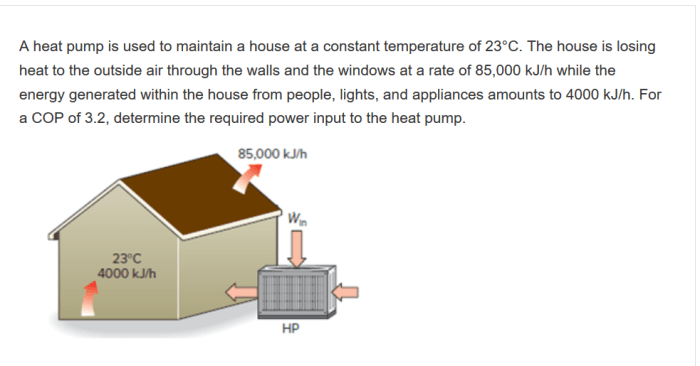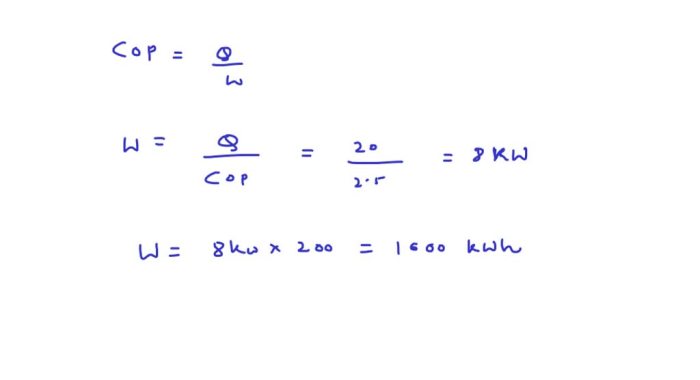A heat pump maintains a dwelling at 68, setting the stage for this enthralling narrative. This discourse delves into the intricacies of heat pump technology, unraveling its fundamental principles, operational mechanisms, and the advantages and drawbacks associated with its implementation.
Our exploration encompasses the concept of Coefficient of Performance (COP), examining its calculation and the factors that influence its magnitude. We elucidate the impact of outdoor temperature on heat pump efficiency, providing a comprehensive understanding of its performance under varying climatic conditions.
Our discussion extends to the practical applications of heat pumps, detailing their utilization for space heating and cooling. We examine their integration with other HVAC systems, assessing their suitability for diverse climates. The intricacies of heat pump installation are meticulously Artikeld, encompassing a step-by-step guide to ensure proper sizing, placement, electrical, and plumbing requirements.
Furthermore, we emphasize the significance of regular maintenance for optimal performance, outlining a detailed schedule for inspections, cleaning, and repairs.
Heat Pump Overview: A Heat Pump Maintains A Dwelling At 68

Heat pumps are a type of heating and cooling system that work by transferring heat from one place to another. They are becoming increasingly popular due to their energy efficiency and environmental friendliness.
Heat pumps work by using a refrigerant, which is a fluid that can easily change from a liquid to a gas and back again. The refrigerant is circulated through a closed system, and it absorbs heat from the air or ground in one place and releases it in another.
Advantages of Heat Pumps
- Energy efficient: Heat pumps can be up to four times more efficient than traditional heating and cooling systems.
- Environmentally friendly: Heat pumps do not produce any emissions, so they are good for the environment.
- Versatile: Heat pumps can be used for both heating and cooling, so they can be used all year round.
Disadvantages of Heat Pumps
- Higher upfront cost: Heat pumps can be more expensive to install than traditional heating and cooling systems.
- May not be suitable for all climates: Heat pumps are not as effective in very cold climates.
- Requires maintenance: Heat pumps require regular maintenance to ensure they are operating efficiently.
Heat Pump Efficiency

The efficiency of a heat pump is measured by its Coefficient of Performance (COP). COP is a ratio of the heat output of the heat pump to the energy input. A higher COP indicates a more efficient heat pump.
COP is affected by a number of factors, including the outdoor temperature, the type of refrigerant used, and the size of the heat pump.
Impact of Outdoor Temperature on Heat Pump Efficiency
The outdoor temperature has a significant impact on the efficiency of a heat pump. As the outdoor temperature decreases, the COP of the heat pump decreases. This is because the heat pump has to work harder to extract heat from the air.
Heat Pump Applications

Heat pumps can be used for a variety of applications, including space heating, space cooling, and water heating.
Space Heating, A heat pump maintains a dwelling at 68
Heat pumps can be used to heat a space by transferring heat from the outside air or ground into the space. This is a very efficient way to heat a space, as it does not require the combustion of fossil fuels.
Space Cooling
Heat pumps can also be used to cool a space by transferring heat from the inside air or ground to the outside. This is a very efficient way to cool a space, as it does not require the use of refrigerants.
Water Heating
Heat pumps can also be used to heat water. This is a very efficient way to heat water, as it does not require the combustion of fossil fuels.
Q&A
What are the advantages of using a heat pump?
Heat pumps offer numerous advantages, including energy efficiency, reduced operating costs, environmental friendliness, and the ability to provide both heating and cooling in a single system.
How does a heat pump work?
Heat pumps operate on the principle of refrigeration, transferring heat from one location to another. In heating mode, they extract heat from the outdoor air and transfer it indoors, while in cooling mode, they reverse the process, removing heat from the indoor air and releasing it outdoors.
What is COP and how does it affect heat pump efficiency?
COP (Coefficient of Performance) measures the efficiency of a heat pump. It is calculated by dividing the heat output by the energy input. A higher COP indicates a more efficient heat pump.